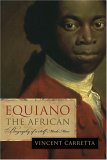
Book Review: Equiano the African

Archives hold their surprises. The one Vincent Carretta chanced upon, among British baptismal and naval records, has led to considerable fame for the University of Maryland literary scholar, and attention to his biography of Olaudah Equiano. Yet it is not hard to imagine Carretta rueing the day, over 10 years ago, when he came across evidence of South Carolina (not West African) birth for the author of the text widely regarded as founding African-American autobiography.
Therein lies much of the problem. Like I, Rigoberta Menchu, object of an earlier authenticity controversy, Equiano’s Interesting Narrative (1789) is asked to bear enormous burdens as proto-slave narrative, earliest literary incarnation of the Black freedom struggle, and ur-text of African Diasporic identity. Equiano’s memoir of slavery and manumission, seafaring labor and Christian conversion, and most of all abolitionist militancy is an extraordinary literary rendering of an exceptional life. A slave from childhood, Equiano became a master mariner; overcame unending frustration, violence, and fraud to earn manumission; traveled the world; and penned, financed, and promoted an unprecedented autobiography.
Carretta, an exhaustive sleuth and careful scholar, wields no hatchet in this biography. Its 350 pages brim with admiration for the achievement of the ultimate “self-made man”—forging identity, autonomy, and career from the crushing origin of chattel slavery. Carretta’s Equiano is also a master rhetorician and subtle reader of his audiences.
In quoting extensively from Equiano, Carretta seeks to underscore the power of an authorial voice he (correctly) finds extraordinary. The Interesting Narrative’s early sections on childhood in Africa, capture, and the Middle Passage, in Carretta’s view, are an act of literary (and self) creation, a rhetorical strategy Equiano likely saw as necessary to make his book an effective abolitionist weapon. The biography’s very title is telling: in referring to Equiano the African, Carretta acknowledges the literary and political strength of the identity Equiano took on.
—Pablo Julián Davis
